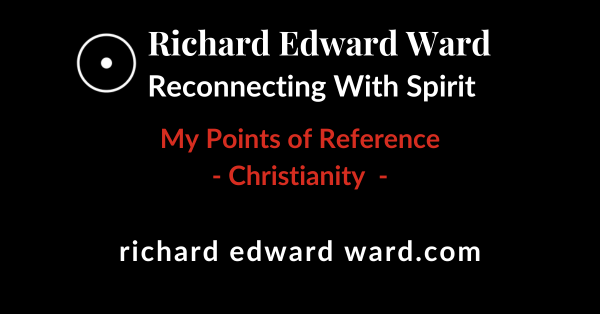Christianity is a major Abrahamic monotheistic religion that originated from the life and teachings of Jesus of Nazareth in the 1st century CE.
It is the world’s largest religion, with approximately 2.8 billion adherents, and is characterized by the belief that Jesus is the Son of God and the Messiah prophesied in the Old Testament of Judaism.
Christianity has been an influence on my life since birth and probably before as I was born into a Christian family, was a member of the Anglican Church of Canada, and I went on to study Theology at McGill University in Montreal, Quebec in the Faculty of Religious Studies. I was thinking of becoming an Anglican priest.
It was particularly interesting to begin to learn to read the Old Testament in Hebrew and the New Testament in Greek.
While I studied at Loyola Communications Arts I was also deeply exposed to the philosophy of the Jesuits who founded the school and college, namely “Understanding why you do what you do is very much in the Jesuit tradition.”
For a time in my life, I was very active in the Anglican Church of Canada but that is no longer the case as I am no longer a practicing Anglican.
Judaism: The Root of the Tree
Judaism is the ancient monotheistic religion of the Jewish people, grounded in the Hebrew Bible (Tanakh) and enriched by centuries of rabbinic teachings found in the Talmud. It emphasizes a covenantal relationship between God and the Jewish people, expressed through commandments (mitzvot), prayer, and ethical living.
Judaism does not recognize Jesus as the Messiah. Instead, it awaits a future messianic age of peace and divine justice. The Jewish faith centers on *practice* (orthopraxy) more than belief, with a strong focus on community, tradition, and the sanctification of daily life.
Jesus of Nazareth: The Bridge and the Divide
Jesus was a Jewish teacher and healer in 1st-century Judea who preached about the Kingdom of God. Christians believe he is the promised Messiah of Judaism, and the Son of God, whose life, death, and resurrection offer salvation to humanity. His teachings form the foundation of Christianity, which emerged as a distinct faith in the decades following his crucifixion.
While early followers of Jesus were Jewish, and the Twelve Disciples founded the first Christian Church, the movement gradually opened to Gentiles (non-Jews), leading to theological and cultural shifts that eventually separated Christianity from its Jewish roots.
Christianity: Faith in the Christ
Christianity centers on the belief that Jesus is the Christ (Greek for “Messiah”), the divine Son of God, and the savior of the world. Its sacred texts include the Old Testament of Judaism and the New Testament, which chronicles Jesus’ life and the early Christian community.
The core Christian doctrines include:
- The Trinity: One God in three persons—Father, Son, and Holy Spirit.
- The Incarnation: Jesus as fully divine and fully human.
- Salvation: Through faith in Jesus, believers are reconciled with God.
Christianity has a rich history and has significantly influenced various aspects of culture, law, and ethics throughout the world.
In exploring the many paths of spiritual healing, few are as historically rich and spiritually influential as Christianity and Judaism. These two Abrahamic faiths are deeply intertwined, yet distinct in belief, practice, and tradition.
Let’s take a closer look at their roots, their relationship, and the major branches of Christianity that have shaped spiritual life across the globe, and in the West the phrase Judeo-Christian culture is often used.
The Main Christian Churches
Over the centuries, Christianity has branched into several major traditions, each with its own theology, liturgy, and spiritual emphasis:
1. Roman Catholic Church
The largest Christian denomination, led by the Pope. It emphasizes tradition, sacraments, and the authority of the Church alongside Scripture.
2. Eastern Orthodox Church
The Eastern Orthodox Church is the original Christian Church. It was founded directly by the 12 Desciples of Jesus and is rooted in the early Christian traditions of the Eastern Roman Empire. Known for its mystical theology, icons, and emphasis on theosis (union with God).
3. Protestant Churches
Emerging from the Reformation in the 16th century, Protestants emphasize Scripture alone (*sola scriptura*) and salvation by faith alone (*sola fide*). Major branches include:
- Lutheran
- Anglican
- Episcopal
- Presbyterian
- Methodist
- Baptist
- Pentecostal/Charismatic
4. New Thought Churches and Christianity: Mind, Spirit, and the Power of Belief
The New Thought movement emerged in the 19th century as a spiritual philosophy emphasizing the power of the mind, positive thinking, and the divine presence within each person.
It draws from metaphysical traditions, Christian mysticism, and transcendentalism, offering a practical spirituality focused on healing, prosperity, and personal transformation.
New Thought churches teach that our thoughts shape our reality, and that aligning with divine principles can bring about healing and fulfillment. These communities often blend prayer, affirmations, meditation, and spiritual study in their practices.
Major New Thought Organizations
- Unity Church: Founded by Charles and Myrtle Fillmore, Unity emphasizes affirmative prayer, spiritual healing, and the divinity of all people. It’s known for its inclusive theology and daily devotional, *The Daily Word*.
- Centers for Spiritual Living: Rooted in the teachings of Ernest Holmes, The Science of Mind, and Religious Science, this tradition focuses on spiritual principles, creative thought, and the law of attraction.
- Divine Science: One of the earliest New Thought denominations, it teaches that God is all-present and that understanding this truth leads to healing and harmony.
- Universal Foundation for Better Living: Founded by Rev. Johnnie Colemon, this organization promotes practical Christianity and spiritual empowerment, especially within African-American communities.
These New Thought churches usually operate independently or through networks like:
- Affiliated New Thought Network https://antn.org/ and
- International New Thought Alliance https://en.wikipedia.org/wiki/List_of_New_Thought_denominations_and_independent_centers
Christianity and My Life
Christianity has been an influence on my life since birth and probably before as I was born into a Christian family, was a member of the Anglican Church of Canada, and I went on to study Theology at McGill University in Montreal, Quebec in the Faculty of Religious Studies. I was thinking of becoming an Anglican priest.
It was particularly interesting to begin to learn to read the Old Testament in Hebrew and the New Testament in Greek.
While I studied at Loyola Communications Arts I was also deeply exposed to the philosophy of the Jesuits who founded the school and college, namely “Understanding why you do what you do is very much in the Jesuit tradition.”
For a time in my life, I was very active in the Anglican Church of Canada but that is no longer the case as I am no longer a practicing Anglican.
The inspirational teachings of Jesus the Christ, and Christian thought, continues to weave its way through my life, thoughts, feeling and spirit although my life.
The inspirational teachings of Jesus the Christ, and Christian thought, continues to weave its way through my life, thoughts, feeling and spirit although my life is also enriched spirituality with Tibetan Buddhism, Taoism, Hinduism, Judaism, Kabbalah, and Shamanism.
My Points of Reference

Explore with Richard
- Welcome
- About Richard
- Reconnecting With Spirit.
- Richard's YouTube Channel
- Recordings by Richard
- Merch by Richard
- Intuitive Counselling Services
- Explore My Spiritual Paths.
- Explore My Teachers, Guides, and Mentors.
- Explore My Recommended Reading, Listening, Watching.
- Explore Self-Healing Tools & Techniques.
- Explore Intuition & Divination Systems.
- Explore Health Issues and Info.
- Explore My 365 Daily Inspiration.
- Explore Posts.
- Explore Pages.
"Be practical and expect miracles when you just take the first step forward every day." -Richard Edward Ward


